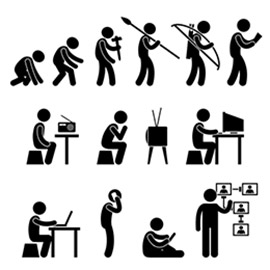REDEMPTION MEDIA BLOG
Recent Posts
- Playing it safe: road safety
- UK Foodbank App Launched
- 2014 Tech Predictions
- Foodbank App: national rollout begins!
- Hack-A-Loo and other stories
Archives
- July 2014
- March 2014
- January 2014
- December 2013
- August 2013
- June 2013
- March 2013
- January 2013
- December 2012
Categories
Adapt or die
Here’s a question for you:
‘Is technology evolving?’
That’s a no brainer! Of course it is, I hear you say. It’s developing all the time – smart phones are getting smarter, connections are getting faster and devices are becoming more powerful.
But are we witnessing a technological evolution in the true sense of the word?
What does ‘evolution’ actually mean? And how is it different from straightforward ‘development’ or ‘progress’?
[Excuse me while I put on my A level biology teacher hat.]
“Evolution is the process by which different organisms develop and diversify from their earlier forms.”
Let’s un-pack that a little. Biologists think that every living organism evolved from a single piece of DNA. That is some development. And talk about diversification – scientists have named over 1.3 million species of organisms on planet earth and there are no doubt many thousands more.
But the process of evolution is as important as its end result. Evolution takes place through a process of ‘natural selection’ which, simply put, involves weaker, less well adapted species becoming extinct while fitter, more competitive species survive and reproduce. A change in DNA that has a positive effect (such as making an animal run faster) will make the organism more likely to survive, more likely to find a mate, and therefore more likely to be passed on to the next generation or start a new species. In other words, bad genes die out whereas good genes proliferate and cause diversity.
Back to technology.
We can’t deny that technology is developing. Look at the smart phone. In 2007 the smartphone species was born. The iPhone featured a 320 x 480 pixel display, 2 MP camera, and a 412 MHz ARM 11 processor. Connection was through Wifi or 2G. Fast-forward to 2012 and compare that to the iPhone 5 with its 640 x 1136 pixel LED-backlit IPS LCD capacitive touchscreen, 8 MP camera, dual-core 1.2 GHz CPU and 4G connectivity, not to mention inbuilt accelerometer, gyro, proximity and compass sensors. That is the kind of progress that would take a biological species a good ten million years to achieve.
Evolution also produces new species and diversity within species. The smart phone market has certainly diversified; there are now over 4000 different Android devices in use, in addition to Blackberry, Windows and iOS devices. Each has different features and selling points but all can be traced back to the founding member of the smart phone family. Species diversification has occurred.
And, looking at the process of evolution, we can see some ‘natural selection’ in progress. Great devices are popular with consumers and increase their market share (for example, Samsung smart phones, iPads), whereas devices that fail to adapt to emerging consumer demands take a nose-dive (Blackberry and Nokia). As in the wild, adaptation, effective competition and finding a niche are the keys to survival.
So we have a rather intellectually satisfying parallel between the evolution of species and the development of technological devices over the last ten years. Very nice.
But so what?
In the technology industry, the diversification of devices is known negatively as ‘fragmentation’. Industry leaders and commentators express concern about how it will be impossible to continue to develop cross-platform software that is compatible with ever-increasing numbers of devices and operating systems.
But, if a process of evolution is truly occurring, then this is a pretty dumb thing to be worried about. Evolution is a good thing; in fact, evolution is the most infallible, reliable, progressive and responsive creative process in the history of the universe. If natural selection is allowed to occur, then we can be sure that technology will get better and better and that ‘bad’ products will not survive.
It doesn’t make sense to be concerned about developing for so many platforms; if there is demand for software, it will be supplied. There is a Facebook app for almost every device and operating system because there is demand for Facebook. If an operating system is difficult to develop for, it will become extinct (original Blackberry OS). At Redemption Media, we have responded to fragmentation by using new techniques and technologies to code multi-platform apps.
My point is this. We can trust evolution to do a great job. So let’s take a positive view of fragmentation and concentrate on making sure we invest in developers and coding techniques that will respond positively to the challenge of new devices.
Ultimately, the challenge of evolution to all of us in the industry is this: adapt or die.

